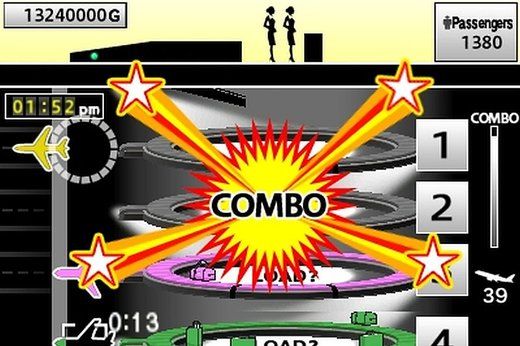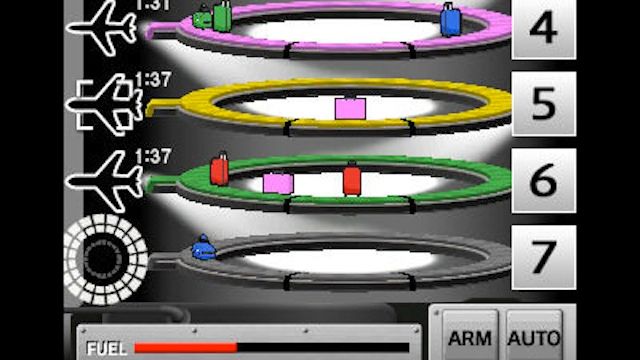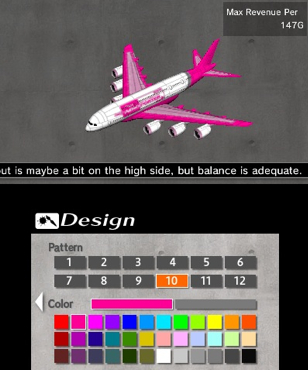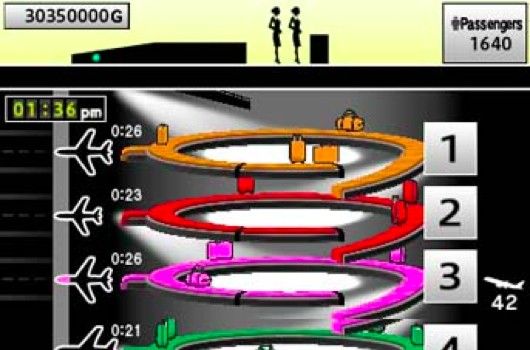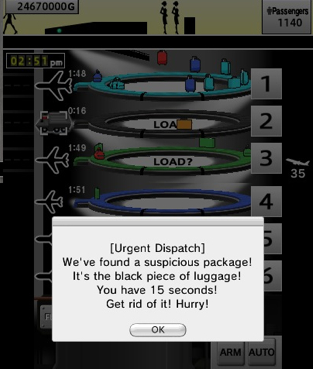3DS owners looking for a challenging and addictive new puzzler need look no further than Aero Porter, from the geniuses at Level-5. Part of the developer’s diverse Guild01 compilation, Aero Porter provides a nonstop and gradually evolving challenge that simply never lets up – for better or for worse. It’s original, stylish and shouldn’t be missed by any genre diehard. However, it probably should be missed by the faint of heart.
Aero Porter puts you in the shoes of a new employee at an upstart airport. Your primary job is the handling and sorting of luggage, but it’s expressed that the rise and fall of the airport is all dependent upon your performance. There’s really no more story than that. As each day progresses your overall performance is evaluated and your superior will offer you some helpful (or sometimes discouraging) advice and commentary. The overall goal is to sort baggage adequately each day and over time attract more clientele to your airport and help it grow. Performing poorly will result in a drop in clients and income, as well as yield castigation from your superior while performing well will result in an increase of clients and funds and yield praise from you superior.
There is no music in Aero Porter. Instead, the sounds of passengers walking around, the chimes and dings from the airport control terminal, the sounds of the planes landing and taking off and the ubiquitous mechanical whirring of the baggage carousels and its functions comprise the music that accompanies the game-play. Not only does the light background noise provide you with the clear state of mind you’ll need to focus on the carousels, but it also feels reminiscent of how an actual airport sounds, only much more peaceful.
The visuals in the game are neat and pleasing. The carousels and bags are conveyed with enough detail to get the job done and I quite like the shadowy figures that are the customers. The bags and carousels utilize a bright, fun color palette that helped make the game relaxing even during the very difficult segments. The little pictures of the planes are cute. In the hangar, the planes look pretty cool but are nothing spectacular. There appears to be almost no use of the console’s stereoscopic 3D functionality, but it really isn’t missed in this type of game. All in all, the game’s looks seem to accomplish exactly what they set out to and it has a charming, almost minimalist kind of appearance.
Aero Porter’s game-play is simple, addictive and utterly and relentlessly challenging. The game starts out fairly easily, but as you gradually unlock upgrades and earn recognition, the boys are separated from the men as things take a turn for the demanding. The goal is to sort the luggage onto various carousels and load them into their respective planes. The carousels, luggage and planes are all color coded; you’ll need to get the blue luggage onto the blue carousel and load it and so on and so forth.
Using the consoles shoulder buttons, you drop and raise luggage between the carousels. It’s very simple and starts out easily. A number of bags of various colors will drop onto the topmost carousel and you’ll need to maneuver the luggage down to the various carousels below and then load it onto the planes. The planes will only remain in the hangar for a certain amount of time. If you load the plane with all of its luggage, it’ll take off on-time and without a hiccup. If you take too long to fill the plane, it will leave without all of its luggage or with no luggage at all. Either of these situations will result in a fee. Too many of these incidents will result in a drop in customers. You can also load incorrect luggage onto a plane, though this is not adequate (but preferable to a plane leaving with no luggage, I think).
As you perform well, you will gradually unlock upgrades, such as a control switch to slowdown or speed-up the carousels, a function to automatically load luggage when it reaches the appropriate carousel, and more. Running the carousels slowly consumes fuel over time (though the consumption rate skyrockets when using the various unlocks) and purchasing more fuel consumes funds. The better you perform the more money and customers you’ll draw and the more recognized your little upstart airport will become.
A variety of special clients help spice things up. Certain politicians need their bags handled discreetly and their luggage will be identified by tag color rather than bag color, which can be tricky. The king of Shebaba will need a container holding a special jewel loaded onto its own plane and you’ll have to tilt the console to carefully get it to its carousel. There will also be suspicious packages that are potentially dangerous and need to be handled quickly. These special clients and events provide a fun break from the basic game-play and are also vital to the growth and success of your airport. Handling a special client effectively will result in even more customers and money, while mishandling them will cause a sharp drop in your airport’s reputation.
At a certain point after the first few in-game days, things start to get really difficult really fast. More carousels appear to compensate for the growth in customers and more and more luggage starts to drop from above. The timers for the planes become stricter and you’ll be literally racing to get the bags sorted and loaded on time. Dropping and raising the luggage you want and only the luggage you want can be nearly impossible, even if you slow the carousels to a crawl. Making adequate use of the upgrades can help with this intense difficulty spike, but finishing the days with a good report gets more and more challenging.
This challenge is surely a selling point for any puzzle game expert who has grown bored with the console’s offerings, but anyone else will have a very hard time meeting their daily quotas.
As you get successful work days behind you, you’ll also unlock planes to decorate in the hangar. Decorating the planes is fun, but it’s not incredibly in depth and you’re unlikely to spend more than a couple of minutes doing it. These planes can be sent to other players via a StreetPass function, though I was unable to make use of it. The few players I occasionally walk past are very unlikely to have purchased Aero Porter and even if they did I doubt that they’d have endured long enough to unlock a plane.
The replay value of Aero Porter depends on how good you are at the game and how much of its relentless challenge you can bear. I had a lot of fun with the game’s first few levels and felt a considerable sense of accomplishment after a day well done. At a certain point, the game became unplayable for me because it was so challenging. I was never frustrated; I simply didn’t consistently feel like exerting all the energy and thought-power needed to perform well at that point. If you’re an ace at this game or at puzzle games in general, then you’d probably never grow tired of the rapidly dropping luggage, spinning carousels or successfully departing flights.
The replay appeal seems to be dependent upon your skill at the game. A lighthearted puzzle fan looking for a fun pick-me-up is unlikely to spend more than a couple of hours with this title while a hardcore genre diehard could find endless enjoyment in it. It depends.
Conclusively, Aero Porter is a fun game with a quickly ascending level of difficulty. The gradual unlocks are rewarding and the special clients are exciting. Completing a day well done feels like a real accomplishment and the praise from your superior helps with that. As your airport grows, though, so does the game’s challenge. You’ll need quicker wits and sharper reflexes as each day rolls by. At a certain point, completing a day at all will be taxing, whether your superior is praising or criticizing your performance.
Unless you’re seeking an intense challenge or a glutton for punishment, your flight with Aero Porter will be rather brief, making alternatives like Pushmo seem like better uses for your $8.

